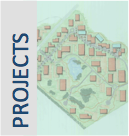Sustainable Facilities
& Infrastructure Lab
Myers-Lawson School of Construction • Virginia Tech



Information for Prospective Faculty Partners
If you’re a faculty member interested in research, education, or outreach related to sustainable facilities and infrastructure systems, then we welcome you to affiliate with our lab and join us in future projects. The Sustainable Facilities & Infrastructure Lab is a core group of faculty, students, and external partners who work together to invent a more sustainable future through built environment innovation. If you’d like to join us, please read on to explore the opportunities.
To become a faculty partner in our SLICES Industry Benchmarking Program that employs student interns working in the field to collect and analyze data about industry best practices, visit:
To learn more about research and outreach opportunities and current projects going on in the SFI Lab, visit:
-
 SFI Lab Current Projects
SFI Lab Current Projects -
 SFI Lab Project Opportunities
SFI Lab Project Opportunities
Click to meet our current faculty partners and learn more about what they do. If you’re interested in learning more or working with us on a specific project, contact Dr. Annie Pearce at apearce@vt.edu.

Featured Faculty Partner:
Dr. Sam Cook, Anthropology
Dr. Sam Cook, an Associate Professor in
Anthropology and Director of American Indian
Studies in Virginia Tech’s College of Liberal
Arts and Human Sciences, joined the SFI team
as an affiliated faculty member in 2011. Sam’s
interests in sustainable facilities and infrastructure
include green preservation of historically
significant facilities and historical understandings of
ecological concepts.
As a cultural anthropologist, Sam is a trained ethnographer whose methodological and theoretical background strives to achieve a holistic understanding of human interaction in any setting. This approach has gained increasing validity as an assessment tool for various corporate and governmental agencies in seeking to become more effective in delivering services and achieving goals, which has resulted in the emergence of a specialized field of “evaluation anthropology”.
Sam brings expertise on historical understandings of “traditional ecological knowledge,” which suggest that sustainability is achievable if it is based on uniform and holistic arrangements of community organization and economic/ecological practice. His recent research and outreach initiatives with Indigenous communities have prepared him to apply this assessment of sustainability concepts to an evaluation of how participants in all levels of a project (and sustainable construction endeavors in general) perceive the concept of sustainability, in order to identify points of both consensus and divergence for realigning enterprise-wide organizational strategies to optimize sustainability.
To learn more about Sam’s background and expertise, visit his web site or contact him via email to sacook2@vt.edu.






